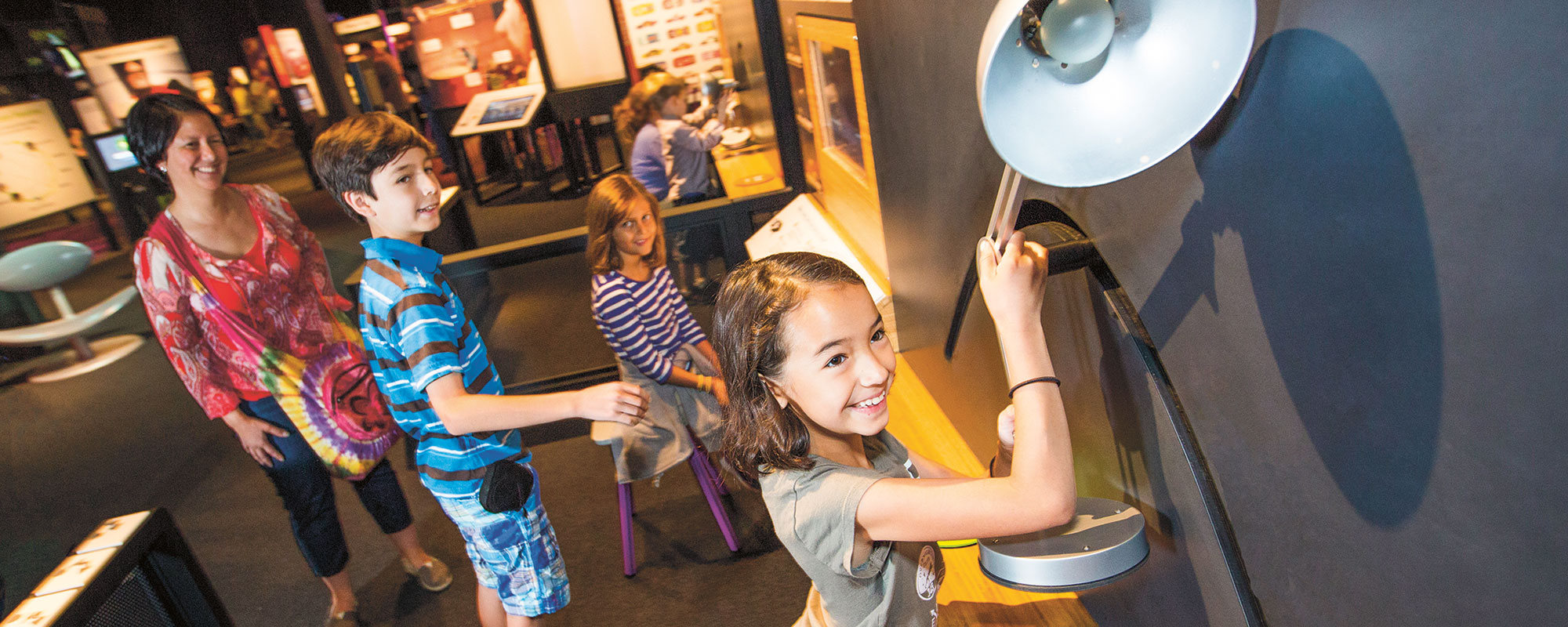You May Also Like
Building a Bridge to an Engineering Career A Living Archive Everybody’s welcome on this dance floorOn a Thursday evening in June, Carnegie Science Center was abuzz with teenagers. They had three hours ahead of them in The Science Behind Pixar exhibition, which is chock-full of interactive and hands-on displays, craft-making, and, of course, snacks.
In the first gallery, a pair of boys leaned toward a touch screen that demonstrates how animators made Elastagirl’s arm stretch in The Incredibles. A few teens snapped gray magnetic shapes onto a base to create a robot. Others took turns posing for pictures in front of life-size statues of Mike and Sulley, who were decked out for Monsters University.
The 81 participants, born approximately between Cars (2006) and Cars 2 (2011), are part of the Carnegie Museums Teen Membership program. Since it launched in November 2021, more than 19,000 teenagers have enrolled to receive free membership to all four Carnegie Museums.
Teen Membership is just one category of the Community Access Memberships, which also include a Family Access Membership available to low-income individuals and families and an Organizational Outreach Membership that provides complimentary admission to community-based nonprofit organizations such as those that work with underserved youth, unhoused individuals, veterans, and seniors receiving public assistance.
“Museums are transformative places, and we want more people of all ages to be able to connect with each other and the world around them at the four Carnegie Museums,” says Steven Knapp, president and CEO of Carnegie Museums.
Community Access Memberships grew out of museum leadership’s vision to open up access to the museums following its 125th anniversary in 2020. The Community Access initiative that was announced in October 2021 also aimed to expand lifelong learning experiences through more teen-centric offerings and programming targeted to seniors. Donor support in honor of Carnegie Museums’ 125th anniversary would make the launch of the program possible.
“Museums are transformative places, and we want more people of all ages to be able to connect with each other and the world around them at the four Carnegie Museums.”
–Steven Knapp, president and CEO of Carnegie Museums
“A milestone anniversary is a time to remember how far we have come, but it’s also a time to dream how far we can go,” Knapp said in announcing the program. “So we are using the occasion of our 125th to look beyond the doors of our museums and imagine new ways of opening them to the communities we serve.”
Shannon Jeffcoat, senior director of membership and annual giving, has been the driving force behind launching and growing the initiative.
During the first year, Jeffcoat and her colleagues expected that maybe 1,000 teenagers would enroll. Within two months, they had more than double that. Families unable to afford the cost of membership also jumped at the chance to become part of Carnegie Museums’ member community. Social-service groups were always encouraged to bring clients to the museums, but the new complimentary membership provides free admission to as many as 11 people per visit, giving groups more flexibility to come as often as they like. Currently, 3,800 families and individuals who qualify for public assistance have signed up to participate, as well as 120 regional social-services organizations.
“One of the biggest challenges to visitation is the financial barrier to participation,” Jeffcoat says.
For individuals or families who are eligible to receive public assistance, Family Access Memberships reduce the annual cost from $160 to $20. Registration is based on the honor system.
Over the past three years, nearly 3,000 visitors have come to the four Carnegie Museums through the Organizational Outreach Membership. Member organizations include Hello Neighbor, Community Living & Support Services, Family House, and Wesley Family Services, among many others.
“When we travel, museums are often a key to learning about the history and culture of a place. The same is true for our new neighbors from around the world,” says Jenni Walkup Jayes, public anthropologist and program manager for Hello Neighbor. “Programs like this invite refugees and immigrants to feel themselves fully at home in Pittsburgh.”
Improving access to Carnegie Museums has also meant creating new kinds of programming for teens and seniors.
Since the start of the Community Access program, more than 3,000 teens have participated in teen events. Bridget Hovell, assistant director of membership and annual giving, says she’s heard from parents who have driven an hour into the city so their teenagers could be part of the experiences.
“There are so few opportunities for teens to have a third space between home and school,” Hovell says. “I think our teen nights kind of offer this very safe, very welcoming, and educational opportunity for them to hang out with each other.”
All four museums now also offer seniors-only events. At Carnegie Museum of Art, the Mindful Museum program brings seniors into the museum on Wednesday mornings, before the doors open to other visitors, for chair yoga, private tours, and artmaking—and some personal time in the galleries.
The Wednesday after the Pixar event, the Museum of Art hummed with Mindful Museum participants. That week’s theme was collage. During the artmaking portion, participants sat around tables in groups, some quietly flipping through magazines and some engrossed in lively conversation. One table of the latter combined women who knew each other from childhood, as well as new friends they met through Mindful Museum and other events. They’ve grown so close during this shared time that they’ve even traveled together.
One of those women, Sue Joslyn, began attending events as something to do after she retired. She loved them so much that she became a docent for the Museum of Art.
“I’ve told them before,” she said, looking around the table, “it changed my life.”
Community Access Membership is presented by Huntington National Bank and supported by Giant Eagle Foundation. Teen Membership is supported by The Grable Foundation and the Robert and Mary Weisbrod Foundation.
Receive more stories in your email
Sign upTags:
The Inclusive Museum
